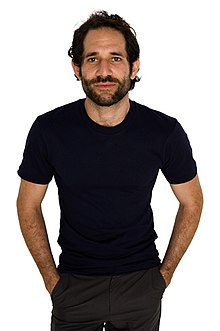Dov Charney
| Dov Charney | |
|---|---|

Dov Charney
|
|
| Born |
January 31, 1969 Montreal, Quebec, Canada |
| Residence | Silver Lake, Los Angeles, California, U.S.A |
| Occupation | Entrepreneur |
Dov Charney (born January 31, 1969) is a Canadian businessman. He is best known for founding American Apparel, where he served as the CEO from 1989 until 2014.
Charney has been associated with several lawsuits, including a lawsuit from film director Woody Allen and sexual harassment lawsuits involving ex-employees. In 2014 the issues resulting from some of these led to his dismissal as the company's chief executive officer.
At American Apparel, Charney was involved in nearly every part of the business process from design and manufacturing to marketing. At a time when the US garment industry had largely shifted to outsourced overseas manufacturing, Charney built American Apparel into a vertically-integrated fashion company—the largest clothing manufacturing operation in the United States—where every aspect of the business, from design and manufacturing to distribution and marketing, was done from American Apparel’s headquarters in Los Angeles. Charney was also responsible for American Apparel to be an early adopter of RFID tags on garments in 2007 in an effort to reduce theft and improve inventory control. In addition, Charney pioneered the Made in USA sweatshop-free model of transparency, fair wages and a refusal to outsource manufacturing. He is also a vocal advocate for immigration reform in the United States through the Legalize LA campaign, which was championed by American Apparel.
Charney was born in Montreal, Quebec. His father, Morris Charney, is an architect, and his mother, Sylvia Safdie, an artist. Charney is a nephew of architect Moshe Safdie. He attended Choate Rosemary Hall, a private boarding school in Connecticut and St. George's School of Montreal. Charney grew up with, and was influenced heavily by, the culture of Montreal and his Jewish heritage. As a teenager, he "fell in love" with the United States, and drew a sharp contrast between American and Canadian cultures. "...when he was 15, and "had fallen in love with the U.S. in the way only a Canadian kid can – because Americans had the freedom to choose from hundreds more kinds of sugar breakfast cereals than us." As a teenager, Charney was an admirer of American-made products. As a teen, he became disillusioned with Quebec nationalism which he felt was widespread during the 1980s.
...
Wikipedia
